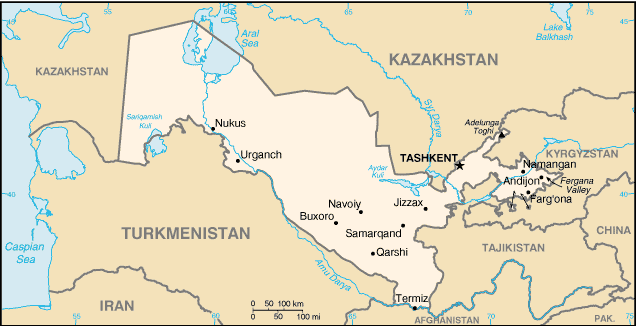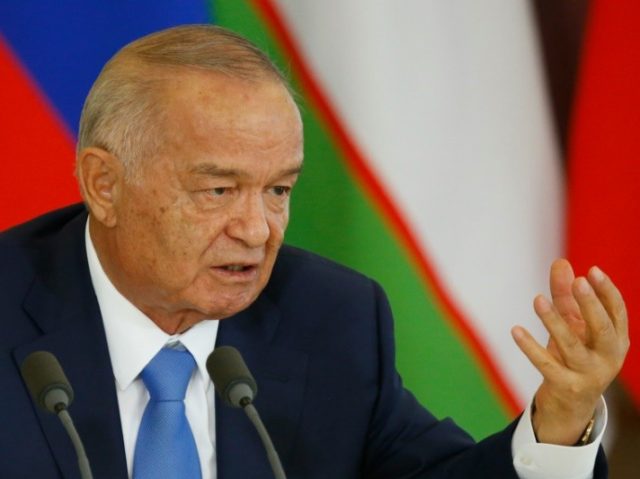This morning’s key headlines from GenerationalDynamics.com
- Uzbekistan’s dictator president Karimov suffers stroke, threatening Central Asia stability
- Brief generational history of Uzbekistan
Uzbekistan’s dictator president Karimov suffers stroke, threatening Central Asia stability

Uzbekistan
All that is known with reasonable certainty is that Uzbekistan’s 78-year-old ruthless, bloody dictator Islam Karimov has been hospitalized with a cerebral hemorrhage. The reason that we think we know that last bit is because his younger daughter, Lola Karimova-Tillyaeva, said so on Instagram on Monday. The rumors are that Karimov has already died. Either way, it is not thought that he will ever govern again.
Karimov became leader of Uzbekistan’s Communist Party in the 1980s, the last decade of the Soviet Union. After the Soviet Union collapsed in 1991, Uzbekistan became an independent country, and Karimov became president. He has been re-elected to office several times in elections that are widely believed to have been rigged.
Karimov has been one of the bloodiest and most brutal dictators in the world, massacring civilians and even boiling protesters alive. According to Human Rights Watch, “thousands are imprisoned on politically-motivated charges. Torture is endemic in the criminal justice system. Authorities continue to crack down on civil society activists, opposition members, and journalists.” Possibly the bloodiest event in Karimov’s tenure was the killing of hundreds of peaceful protesters in the Fergana valley in 2005.
These are, unfortunately, standard tactics for a dictator of a country in the decades following a generational crisis civil war. We see it every day in Syria, where Shia/Alawite Bashar al-Assad is conducting a genocidal holocaust against the losing ethnic group, the Sunnis. We see it all the time in Zimbabwe, where president Robert Mugabe, of the Shona tribe, has conducted a continuing holocaust against the losing tribe the Nbdele.
The reason that these bloody dictators do what they do is because they believe that it is necessary to prevent more tribal fighting and, even more important, it is necessary to prevent the dictator from being thrown out of office, giving power to the other tribe.
Karimov used more than just torture and atrocities to keep the country and the region stable. He had relations with all the powers — the US, Russia, China, and the other Central Asian nations — and was able to play them off one another.
Uzbekistan is right in the middle of Central Asia, and shares a border with all the other Central Asia states. Instability there would quickly spread to the entire region. One border that is of particular importance to Americans is the one with Afghanistan, where American troops are fighting the Taliban, and the Taliban are gaining strength. Besides the Taliban, one particularly potent al-Qaeda linked jihadist group is the Islamic Movement of Uzbekistan (IMU), who for the last decade have been considered the most formidable terrorist group in Afghanistan and Pakistan.
The fragility of the region was illustrated on Tuesday by car bombing near the Chinese Embassy in Bishkek in Kyrgyzstan, injuring three embassy personnel. No one has claimed responsibility, but the perpetrators might be Uighur separatists or the IMU or a terror group linked to the so-called Islamic State (IS or ISIS or ISIL or Daesh). It’s not believed that the attack is related to Karimov’s stroke, but it illustrates the growing threat of jihadist terrorism, especially since it’s believed that several thousand Uzbeks have gone to Syria to fight Bashar al-Assad.
Thursday is Uzbekistan’s independence day. In the base, Karimov has attended the celebrations and performed a traditional dance. Whether he’s dead or still alive, it’s not expected that he’ll be doing is dance this time. We may get a sense of whether there is a solid line of succession or whether there’ll be a succession battle that could spiral out of control. CNN and Atlantic Sentinel and Irish Times and Stratfor and Xinhua
Related Articles
- Uzbekistan closes border to refugees from Kyrgyzstan (15-Jun-2010)
- Jihadists from New York to Uzbekistan flock to Syria to fight (21-May-2014)
- Islamist Uzbeks lead terrorists in Pakistan and Afghanistan (2-Nov-2009)
Brief generational history of Uzbekistan
The historic importance of Uzbekistan is well illustrated by how many conquering armies swept through. By about 400 BC, the Uzbekistan region was dominated by tribes of Persian descent and Greek descent, conquered by Alexander the Great. The region became critical for trade between China and the Roman Empire. In the 700s AD, only a few decades after the Prophet Mohammed, the armies of Islam invaded and took control. Around 1000 AD, a confederation of Turkish tribes known as the Ghazna conquered part of the region and established a state.
In the thirteenth century the Mongol leader Genghis Khan put together an alliance of Mongol and Turkic tribes in north central Asia, known as the Golden Horde, which embarked upon a conquest of much of Asia. One of the leaders of that alliance was Uzbek, a man who accepted Sunni Islam as his religion. The Moslem branch of the Golden Horde became known as the Uzbeks.
In the mid-1800s, the Russians invaded, with an ironic outcome. Russia had lost its supply of cotton from the southern United States because of the American Civil War, and the Russians wanted to establish a safe source of cotton, and so they developed a large cotton-producing agriculture in Uzbekistan.
World War I and the Bolshevik Revolution of 1917 was an extremely bloody generational crisis war for Uzbekistan, fought between the Sunni Muslim Uzbeks and the Orthodox Christian Russians. This was Uzbekistan’s last generational crisis war.
World War II thus occurred during a generational Awakening era for the Uzbeks. Thus the Uzbeks stayed out of the war, and in fact carried out a “humanitarian mission,” according to Turkish history. Russia drafted thousands of Uzbek men to fight the Nazis, but the the country itself performed a humanitarian mission by sheltering hundreds of thousands of refugees from fascist occupied territories.
As part of Stalin’s Soviet Union, Uzbekistan became a cotton powerhouse starting in the 1920s. In support of the cotton trade, millions of ethnic Russians began pouring into the country, especially into the fertile Fergana Valley (or Ferghana Valley), in the far eastern portion of the country.
The old Uzbek/Russian fault line became critical again, starting in the 1980s with the Russian invasion of Afghanistan. At that time, Uzbek militants began joining the Pashtuns in Afghanistan to fight the Soviets.
1991 was a pivotal year for the Fergana Valley. That was the year that the Soviet Union collapsed, resulting in the formation of Uzbekistan as an independent republic. It also resulted in a great deal of financial hardship for the Russians in the Fergana Valley. The result was the first signs of Islamic fundamentalism in Uzbekistan when some unemployed young Muslims seized the Communist Party headquarters in the city of Namangan in the Fergana Valley.
The leaders of this terrorist action, Tohir Yuldeshev and Juma Namangani, eventually made their way to Afghanistan in 1996, after the Taliban had taken control of the government. They joined Osama bin Laden and al-Qaeda, and formed the Islamic Movement of Uzbekistan (IMU).
The IMU has been playing an important role in terrorist acts in Afghanistan and Pakistan. Karimov’s bloody massacre of hundreds of peaceful protesters in 2005 was an attempt to prevent a violent takeover by Islamist IMU militants. Journal of Turkish Weekly and San José State University and Advantour
KEYS: Generational Dynamics, Uzbekistan, Islam Karimov, Lola Karimova-Tillyaeva, Russia, Soviet Union, Syria, Bashar al-Assad, Zimbabwe, Robert Mugabe, Islamic Movement of Uzbekistan, IMU, China, Kyrgyzstan, al-Qaeda, Islamic State / of Iraq and Syria/Sham/the Levant, IS, ISIS, ISIL, Daesh, Alexander the Great, Mohammed, Genghis Khan, Golden Horde, Bolshevik Revolution, Fergana Valley, Ferghana Valley
Permanent web link to this article
Receive daily World View columns by e-mail

COMMENTS
Please let us know if you're having issues with commenting.